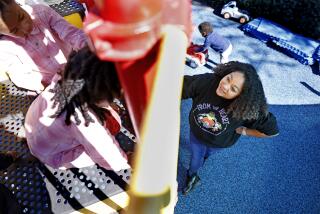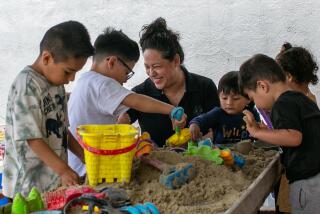Training Improves Child Care, Studies Say : Children: Researchers find that the bleak picture painted by previous reports can be brightened up fairly easily.
- Share via
In the face of recurring research showing that most American child care is of poor to mediocre quality, new studies offer heartening proof that efforts to improve care can actually succeed.
Twin reports by the nonprofit Families and Work Institute of New York, released Tuesday, found that provider training, improved staff ratios and enhanced education credentials enrich children’s development and the quality of care.
Ellen Galinsky, co-president of the institute, said she was especially encouraged that even a “small, fairly modest” level of intervention produced “measurable, qualitative” gains for children.
“As little as 18 to 36 hours of training actually affects kids’ development,” she said.
The Family Child Care Training Study and the Florida Child Care Improvement Study, each conducted over a three-year period, were undertaken in response to recent research showing that only 12% to 14% of U.S. children are in centers rated as good quality. The 12% to 21% in potentially harmful settings include 35% to 40% of this country’s infants and toddlers.
The negative findings were “absolutely consistent” regardless of geography or economic considerations, Galinsky said. Conversely, the current studies showed “noteworthy and replicable” efforts in a variety of communities where child care was rated outstanding.
The Family Child Care Training Study targeted 130 family child-care providers in the San Fernando Valley, in Dallas and in Charlotte, N.C. Providers in these areas were observed before and after receiving training from Child Care Aware, a national project operating in 40 communities. Comparisons were made at the same locations with 112 regulated providers, who were not trained.
Following training, children were observed to be more securely attached to providers and quality scores at the sites rose. In addition, 97% of trained providers reported higher incomes from child care with many seeking out additional training opportunities.
The Florida study examined the impact of state legislation implemented in 1992 that lowered child-to-teacher ratios for infants and toddlers. The legislation also mandated stricter credentials for providers. The state-run program used federal funds to help implement these changes.
Overall quality rose dramatically, the new study found. Impressive changes were also revealed in children’s intellectual and emotional development.
These lessons “have tremendous implications for improving early childhood care and education across the United States,” said Carollee Howes of the UCLA School of Education, a principal investigator on the Florida project.
The latest research takes on new urgency, Galinsky noted, because child-care provisions included in legislation passed by Congress last month would seriously turn back efforts to make improvements in the quality of child care.
The measure passed by the House of Representatives eliminates federal provisions in the child-care block grant, which set aside funds to improve child-care quality and to ensure that providers receiving federal funds meet minimum health and safety standards.
“In Florida,” Galinsky said, “this effort would not have happened if the block grant hadn’t been available.”
More to Read
Sign up for Essential California
The most important California stories and recommendations in your inbox every morning.
You may occasionally receive promotional content from the Los Angeles Times.













